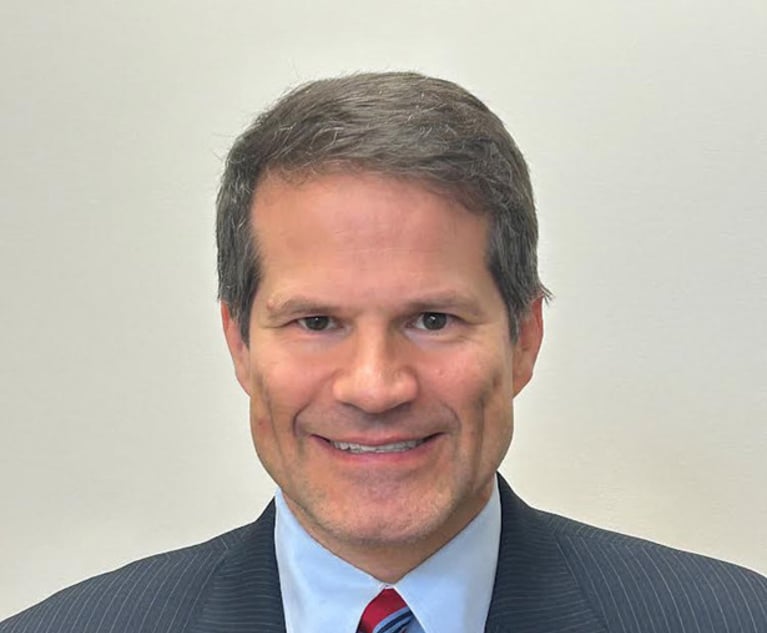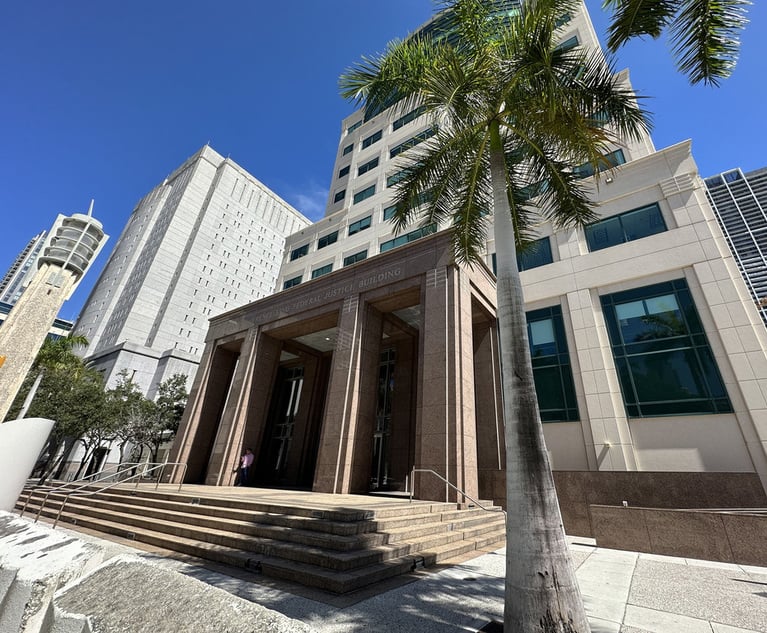Midlevel Associates Crave Clarity on Office Returns: The Morning Minute
The news and analysis you need to start your day.
August 24, 2021 at 06:00 AM
5 minute read
Want to get this daily news briefing by email? Here's the sign-up.
|
WHAT WE'RE WATCHING
NO FIRM PLANS - As we've noted in this space several times, many law firms have had trouble committing to and/or clearly communicating their return-to-office policies. To the extent that this tentativeness is the result of the ever-shifting nature of the pandemic, it's probably understandable—but it's still not doing firms any favors. As Law.com's Dylan Jackson reports, The American Lawyer's 2021 Midlevel Associates Survey found that respondents are uneasy about a perceived lack of communication from their firm's management, especially as it relates to return plans that vary widely in terms of both in-office requirements and the detail firms have provided. "[My firm] has given us the freedom to work remotely; however, they have not clearly communicated a criteria for which return to the office is expected, leading to uncertainty and related anxiety," said one fourth-year associate in the Washington, D.C., office of a firm near the top of the Am Law ranking. Another respondent—a fourth-year associate at an Am Law 100 firm in New York—said their firm held "biweekly meetings with associates to update them on new developments, firm strategy, and on-the-ground impact on associates" but has, up until very recently, "refused to provide any kind of meaningful explanation of how/when/where we will return to the office."
HYRBRID HOW-TO - For those firms that actually do have a plan for returning to in-person work, Law.com's Victoria Hudgins has put together a handy guide for navigating a hybrid environment in which some attorneys and staff are in the office while others work remotely. I'm not going to give away the whole article, which features advice from law firm leaders, consultants and GCs. Instead, I'd encourage you to give it a full read. But since there's been a lot written in this space recently about hand-wringing over whether and how professional development can happen in a virtual setting, I thought I'd highlight deputy Dominion Energy GC Carlos Brown's tip for engaging promising, but typically underrepresented, attorneys: make the effort to seek out virtual one-on-one interactions. Brown suggested, for example, following up with diverse attorneys after productive meetings. "If you're trying to support a new lawyer, and you can't sit beside them or meet face-to-face, that's going to become more challenging for lawyers of color," Brown told Law.com. "But it'll be challenging in development, not necessarily in the practice of law."
TARGETED SOLICITATIONS - Kirkland & Ellis and Jackson Lewis filed a trade secret lawsuit Monday in Nevada District Court on behalf of Byrna Technologies Inc., a manufacturer of .68 caliber non-lethal defense technology. The complaint accuses Duke Defense and other defendants of soliciting Byrna's senior employees and misappropriating confidential information to form a Byrna competitor. Counsel have not yet appeared for the defendants. The case is 2:21-cv-01559, Byrna Technologies, Inc. v. Duke Defense USA, Inc. et al. Stay up on the latest deals and litigation with the new Law.com Radar.
|
EDITOR'S PICKS
|- Is the Legal Profession Experiencing an Existential Crisis? McDermott Chairman Thinks There's a Better Way. By Alaina Lancaster and Zack Needles
- GMU Law Professor Drops Suit Challenging Vaccine-Mandate Policy—But His Lawyer Wants to Sue Again By Jason Grant
- Star Democratic Party Attorney Marc Elias Is Leaving Perkins Coie to Spin Off New Firm By Dylan Jackson
- Tenth Circuit Upholds Colorado's Anti-Discrimination Act Against Constitutional Challenge By Christopher Jackson and Jessica Smith
- California State Bar to Investigate Tech Troubles on July Bar Exam By Cheryl Miller
|
WHILE YOU WERE SLEEPING
BUILDING A PRACTICE - An infrastructure building boom in Australia is keeping firms' construction disputes partners busy and leading to an uptick in partner poaching as firms position for more disputes, Law.com's Christopher Niesche reports. "There's a huge program of infrastructure work being undertaken … and inevitably disputes arise when unforeseen risks eventuate," Alison Close, a construction partner Clayton Utz, said. Australian lawyers are still seeing disputes resulting from the country's last mining and oil and gas boom. But much of the increase is due to additional infrastructure investment in recent government budgets and private investment in the mining and utilities industries. The government is upgrading transport in Melbourne and Sydney, for example, and resources companies are developing new projects. All this building work will likely lead to more disputes in the future, Glen Warwick, a Perth-based construction partner at Clyde & Co, told Niesche. "The market seems busy across all major centers in Australia, given the appetite of both federal and state governments to invest in infrastructure," Warwick said. "COVID has caused some disruption but this seems unlikely to reverse the general trend towards increased construction activity and resultant disputes."
|
WHAT YOU SAID
"Before you step into a conference room or jump on a call or log into a Zoom meeting, take the time to ask yourself, 'What value will I be adding?' If you cannot easily answer that question—go back to the drawing board."
This content has been archived. It is available through our partners, LexisNexis® and Bloomberg Law.
To view this content, please continue to their sites.
Not a Lexis Subscriber?
Subscribe Now
Not a Bloomberg Law Subscriber?
Subscribe Now
NOT FOR REPRINT
© 2024 ALM Global, LLC, All Rights Reserved. Request academic re-use from www.copyright.com. All other uses, submit a request to [email protected]. For more information visit Asset & Logo Licensing.
You Might Like
View All
From ‘Deep Sadness’ to Little Concern, Gaetz’s Nomination Draws Sharp Reaction From Lawyers
7 minute read
‘What’s Up With Morgan & Morgan?’ Law, Advertising and a Calculated Rise
10 minute read
Conservative Boutiques That Backed Trump Reap Their Rewards

What Will Happen to the Nominees in Florida's Southern and Middle Districts?
3 minute readLaw Firms Mentioned
Trending Stories
- 1Philadelphia Bar Association Executive Director Announces Retirement
- 2SEC Chair Gary Gensler to Resign on Trump's Inauguration Day
- 3How I Made Partner: 'Develop a Practice Area You Really Care About,' Says Jennifer A. Gniady of Stradley Ronon
- 4Indian Billionaire Gautam Adani Indicted in Brooklyn for Alleged Orchestration of $250 Million Bribery Plot
- 5St. Ivo: Patron Saint of Lawyers
Who Got The Work
Michael G. Bongiorno, Andrew Scott Dulberg and Elizabeth E. Driscoll from Wilmer Cutler Pickering Hale and Dorr have stepped in to represent Symbotic Inc., an A.I.-enabled technology platform that focuses on increasing supply chain efficiency, and other defendants in a pending shareholder derivative lawsuit. The case, filed Oct. 2 in Massachusetts District Court by the Brown Law Firm on behalf of Stephen Austen, accuses certain officers and directors of misleading investors in regard to Symbotic's potential for margin growth by failing to disclose that the company was not equipped to timely deploy its systems or manage expenses through project delays. The case, assigned to U.S. District Judge Nathaniel M. Gorton, is 1:24-cv-12522, Austen v. Cohen et al.
Who Got The Work
Edmund Polubinski and Marie Killmond of Davis Polk & Wardwell have entered appearances for data platform software development company MongoDB and other defendants in a pending shareholder derivative lawsuit. The action, filed Oct. 7 in New York Southern District Court by the Brown Law Firm, accuses the company's directors and/or officers of falsely expressing confidence in the company’s restructuring of its sales incentive plan and downplaying the severity of decreases in its upfront commitments. The case is 1:24-cv-07594, Roy v. Ittycheria et al.
Who Got The Work
Amy O. Bruchs and Kurt F. Ellison of Michael Best & Friedrich have entered appearances for Epic Systems Corp. in a pending employment discrimination lawsuit. The suit was filed Sept. 7 in Wisconsin Western District Court by Levine Eisberner LLC and Siri & Glimstad on behalf of a project manager who claims that he was wrongfully terminated after applying for a religious exemption to the defendant's COVID-19 vaccine mandate. The case, assigned to U.S. Magistrate Judge Anita Marie Boor, is 3:24-cv-00630, Secker, Nathan v. Epic Systems Corporation.
Who Got The Work
David X. Sullivan, Thomas J. Finn and Gregory A. Hall from McCarter & English have entered appearances for Sunrun Installation Services in a pending civil rights lawsuit. The complaint was filed Sept. 4 in Connecticut District Court by attorney Robert M. Berke on behalf of former employee George Edward Steins, who was arrested and charged with employing an unregistered home improvement salesperson. The complaint alleges that had Sunrun informed the Connecticut Department of Consumer Protection that the plaintiff's employment had ended in 2017 and that he no longer held Sunrun's home improvement contractor license, he would not have been hit with charges, which were dismissed in May 2024. The case, assigned to U.S. District Judge Jeffrey A. Meyer, is 3:24-cv-01423, Steins v. Sunrun, Inc. et al.
Who Got The Work
Greenberg Traurig shareholder Joshua L. Raskin has entered an appearance for boohoo.com UK Ltd. in a pending patent infringement lawsuit. The suit, filed Sept. 3 in Texas Eastern District Court by Rozier Hardt McDonough on behalf of Alto Dynamics, asserts five patents related to an online shopping platform. The case, assigned to U.S. District Judge Rodney Gilstrap, is 2:24-cv-00719, Alto Dynamics, LLC v. boohoo.com UK Limited.
Featured Firms
Law Offices of Gary Martin Hays & Associates, P.C.
(470) 294-1674
Law Offices of Mark E. Salomone
(857) 444-6468
Smith & Hassler
(713) 739-1250









